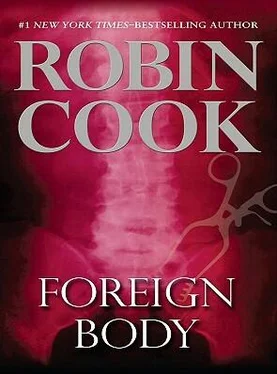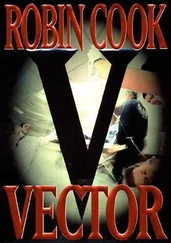Just stay cool, Jennifer silently advised herself, hoping at any second to hear her name being called out over the din. Unfortunately or fortunately, Jennifer was not sure whether anyone had accosted her by the time she reached the top of the ramp. Unwilling to press into the mob, she turned around and as slowly as she’d risen up the incline, she now descended. No one had called out to her by the time she reached the exit doors, or if they had, she hadn’t heard it.
With the idea of returning inside to see if there was any kind of information available for hotels, the doors burst open and out came a youthful man in a porter’s uniform that was a step down in appearance from those worn by the custom men. He looked more like a student than a professional porter, and the uniform was not only tattered but also much too big. He was pushing a four-wheeled cart loaded with luggage. As he came through the doors, he had built up speed to get up the incline. As a consequence, he almost ran into Jennifer.
“I beg your pardon,” the porter exclaimed, catching sight of Jennifer and with some difficulty pulling his cart to a stop.
Jennifer stepped aside. “It’s my fault. I shouldn’t be trying to enter an exit. Can you tell me if there’s an information booth around? Someone from my hotel was supposed to be meeting me, but I don’t know where.”
“What hotel?”
“The Amal Palace.”
The porter whistled. “If someone was supposed to pick you up from the Amal, they will be here no doubt whatsoever.”
“But where?”
“Go up to the top of the ramp and turn right. They’ll be a number of them for sure in that general area. They’ll all be in dark blue uniforms.”
Jennifer thanked the man and headed back up the ramp. Although she still felt mildly reluctant to push into the crowd, she did so, and as the porter promised, she immediately found the Amal greeters in their highly pressed sartorial splendor. Although Jennifer thought it odd they didn’t make themselves more apparent, she now confronted the man with her name on his chalk board. He introduced himself as Nitin and took her two pieces of luggage. He also called Rajiv, who was to be her driver, on his cell phone before ushering Jennifer out of the terminal. As they walked, he kept up a friendly banter.
When Jennifer and Nitin got outside and were standing on the curb waiting for Rajiv to bring the car around, Jennifer again noted the heavy foglike haze that blanketed the area and hung heavy halos around the airport’s streetlamps and the headlights of cars. It was exactly as she’d seen from the plane, but now with the addition of an acrid smell.
“Is this haze typical?” she asked Nitin, while she wrinkled her nose.
“Oh, yes,” Nitin said. “At least at this time of year.”
“What time of year is it not around?”
“During monsoon.”
“Is that it?”
“That’s it.”
“What causes it?”
“Dust and pollution, I’m afraid. We have eleven and a half million people in Delhi now, more or less officially, with more people moving into Delhi every day than are born here. Unofficially, I think it’s more like fourteen million. It’s a mass migration from the countryside, which is straining everything, and causing increased traffic. The smog is from exhaust and dust from the streets mostly, but the factories here in the outskirts add to it, too.”
Jennifer was horrified but didn’t comment. She thought L.A. was bad in September, but Delhi made L.A. seem like springtime in an Alpine pasture.
“Here comes Rajiv,” Nitin said as an ultra-shiny black Ford Explorer with darkly tinted windows pulled up to the curb. Rajiv leaped from the driver’s seat, came around the vehicle, and greeted Jennifer in the typical Hindu fashion of pressing his palms together, bowing over them, and saying “namasté.” He was attired in a splendid, spotlessly clean, freshly pressed white uniform complete with white gloves and a white visored cap. While he opened the rear door for Jennifer, Nitin loaded her two bags in the back. A moment later, she and Rajiv were on their way into New Delhi.
Passing the first car heading in the opposite direction took Jennifer by complete surprise. Although the Explorer’s steering wheel was on the right, the implication hadn’t dawned on her. When the headlights of the approaching car appeared out of the gloom and headed for them, she assumed they would pass on the right, but as the vehicles sped closer together, the oncoming car did not move to Jennifer’s right. On the contrary, it appeared to be drifting to the left. The moment the two cars passed, Jennifer had to suppress a scream, expecting they were about to collide head-on. It was only then that she figured it out. In India, like in Great Britain, autos kept to the left and passed on the right.
With her heart thumping in her chest, Jennifer sat back. She was ashamed of her travel naïveté. To calm down, she used the cold towel Rajiv had given her to mop her brow and took a sip from the iced bottle of water he had provided. Meanwhile, she stared out the window in amazement about what she was seeing.
Once they had reached the main highway from the airport access road, their progress slowed to a crawl. Despite being after midnight, the road was choked in both directions with all manner of vehicles, but mostly trucks, every one of them overloaded in the extreme. Over all hung a choking layer of both exhaust fumes and dust plus the din of unmuffled engines and each vehicle’s horn sounding every few seconds for no reason other than the mere whim of the driver.
As Jennifer looked out on the scene, she found herself shaking her head in disbelief. It was like a wild dream, and if this was the way traffic was at midnight, she couldn’t even conceive of what it was going to be like during the day.
The driver spoke reasonable English and was more than willing to play tour guide as they worked their way into the city. Jennifer peppered him with questions, particularly when he turned off the main road and entered the residential section of Chanakyapuri. Here at least there were no trucks or buses and the traffic moved more freely. Jennifer noted block after block of relatively similar huge white mansions, which appeared to be mildly dilapidated but still impressive. She asked about them.
“They are British Raj-era bungalows,” the driver said. “They were for the British diplomats and are still used by some diplomats.” Soon the driver was pointing out the various foreign embassies, for which he seemed proud. He pointed out the American embassy, which looked rather ugly to Jennifer when compared with those of many of the other countries. Its main characteristic was that it was large. Jennifer turned as it passed by on her left to get a better view. She imagined she’d probably have to make a visit for help dealing with her grandmother’s remains.
Next the driver pointed out the Indian government buildings, which were stunningly impressive. He said they had been designed by a famous English architect, whom Jennifer had never heard of. A few minutes later they reached the hotel and pulled up its ramp to the front entrance. At first she was disappointed. The structure was merely a modern high-rise that could have been anywhere in the world. She’d expected something more typically Indian.
But inside it was another story. To her surprise, the hotel’s public spaces were buzzing with activity despite the hour, and Jennifer had to wait in line to check in. Actually, it wasn’t a line per se but a comfortable chair where she was offered refreshments and given a chance to gaze around the lobby area. Instantly, Jennifer could see why the porter at the airport had responded as he had when she’d named where she was to stay. Jennifer had not stayed in many hotels in her life and certainly never in one like the Amal Palace. It was, in her own words, sumptuous, even decadent.
Читать дальше












